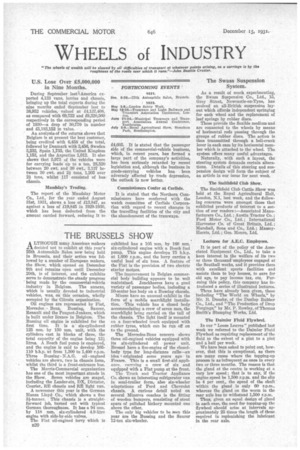WHEELS of INDUSTRY
Page 38

If you've noticed an error in this article please click here to report it so we can fix it.
"The wheels of wealth will be slowed by all difficulties of transport at whatever points arising, as a carriage is by the roughness of the roads over which it rans."—John Beattie Crozier.
U.S. Lose Over £5,000,000 in Nine Months.
During September las0America exported 4,133 vans, lorries and chassis, bringing up the total exports during the nine months ended September last to 38,952 vehicles, valued at £4.137,408, as compared with 69,722 and 19,320,560 respectively in the corresponding period of 1930—a drop of 30,770 in number and £5,183,152 in value.
An analysis of the returns shows that Belgium is at present the best customer, being credited with 6,458 of the total, followed by Denmark with 3,456, Sweden 3,232, Spain 1,735, the United Kingdom 1,153, and the Argentine 1,012. It also shows that 5,973 of the vehicles were for carrying loads up to a ton, 28,520 between 20 cwt. and 30 cwt., 3.137 between 30 cwt. and 2i tons, 1,205 over 24 tons, whilst 117 consisted of bus chassis.
Maudslay's Trading.
The report of the Meadslay Motor Co., Ltd., for the year ended August 31st, 1931, shows a loss of £13,847, as against a loss of £19,845 in 1929-1930, which has been deducted from the amount carried forward, reducing it to 14,605. It is stated that the passenger side of the commercial-vehicle business, which, in recent years, has formed a large part of the company's activities, has been seriously retarded by recent legislation and, although the business in goods-carrying vehicles has been adversely affected by trade depression, the outlook is now better.
Commissioners Confer at Carlisle.
It is stated that the Northern Cammissioners have conferred with the watch committee of Carlisle Corporation with regard to recent changes in the travelling facilities of the city and the abandonment of the tramways.
The Swass Suspension System.
As a result of much experimenting, the Swass Suspension Co., Ltd., 15, Grey Street, Newcastle-on-Tyne, has evolved an all-British suspension layout which affords independent springing for each wheel and the replacement of leaf springs by rubber discs.
These provide the flexible medium and are connected to the wheels by means of horizontal rods passing through the groups of rubber discs. The action is then transmitted through a bell-crank lever in each case by its horizontal member which is attached to the wheel. The system offers many useful advantages.
Naturally, with such a layout, the steering system demands certain alterations. Details of this steering and suspension design will form the subject of an article in our issue for next week.
The Smithfield Club Show.
The Smithfield Club Cattle Show was held at the Royal Agricultural Hall, London, N.1, last week, and the followingconcerns were amongst those that exhibited products of interest to a section of our readers :—Associated Manufacturers Co., Ltd.; Austin Tractor Co.; Ford Motor Co., Ltd.; International Harvester Co. of Great Britain, Ltd.; Marshall, Sons and Co., Ltd. ; MasseyHarris, Ltd.; Geo. INIonro, Ltd.
Lectures for A.E.C. Employees.
It is part of the policy of the Associated Equipment Co., Ltd., to take a keen interest in the welfare of its two or three thousand employees engaged at the Southall works, and it provides them with excellent sports facilities and assists them to buy houses, to save for old age, to pay income tax, etc. Pursuing this policy, this company has introduced a series of illustrated lectures.
Three have already been given, these including "The World on Wheels," by Mr, B. Dunsby, of the Dunlop Rubber Co., Ltd., and "The Production of Drop Forgings," by Mr. P. Rowley, of Thomas Smith's Stamping Works, Ltd.
The Daimler Fluid Flywheel.
In our "Loose Leaves" published last week we referred to the Daimler Fluid Flywheel as requiring replacement of the Said to the extent of a pint to a Pint and a half per week.
We have been asked to point out, however, that this is exceptional, as there are many cases where the topping-up process is as infrequent as once in every two or three months. The reason is that the gland at the centre is working at a very low speed; that is to say, if the engine speed be 1,500 r.p.m. and the slip be 4 per cents the speed of the shaft within the gland is only 60 r.p.m., whereas the gland on the worm in the rear axle has to withstand 1,500 r.p.m.
Thus, given an equal design of gland in each case, the need for topping-up the flywheel should arise at intervals approximately 25 times the length of those required in replenishing the lubricant in the rear axle.




































































































